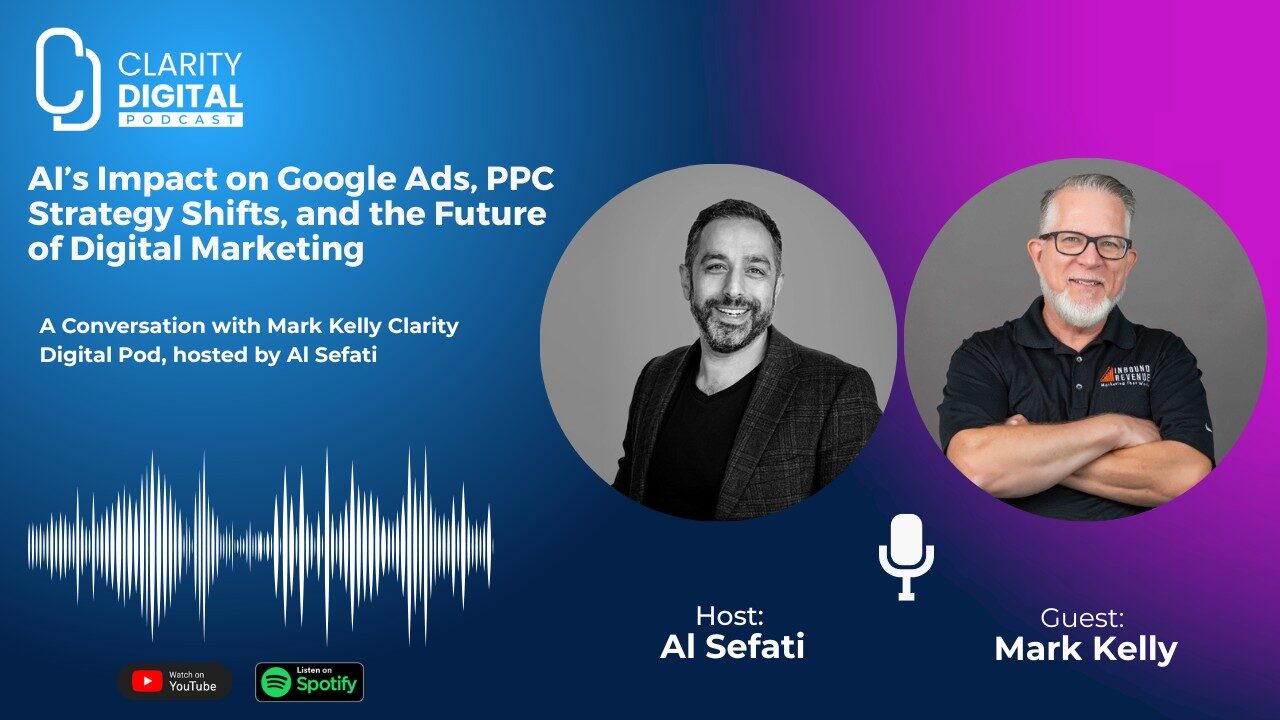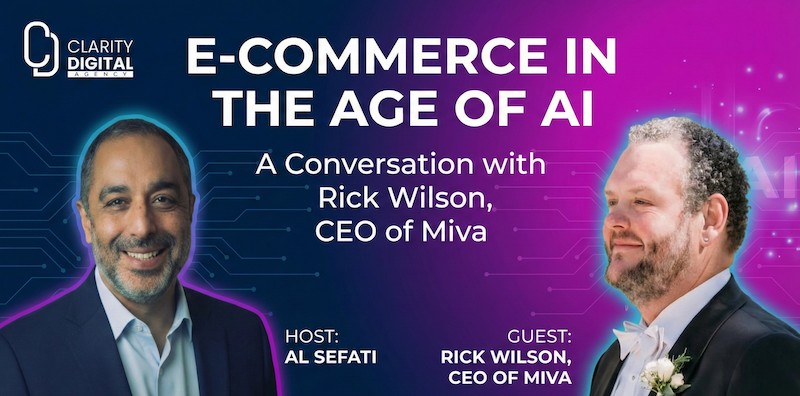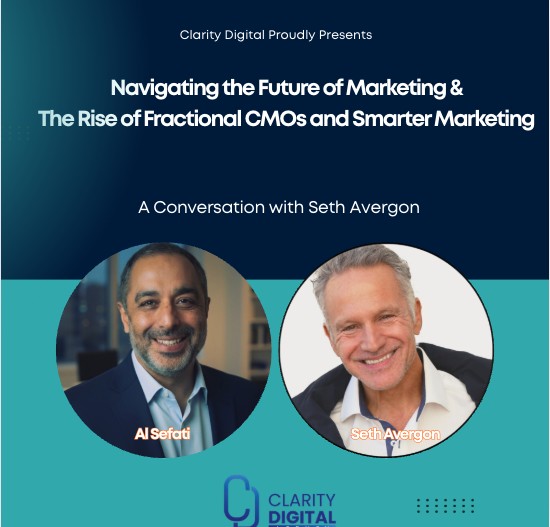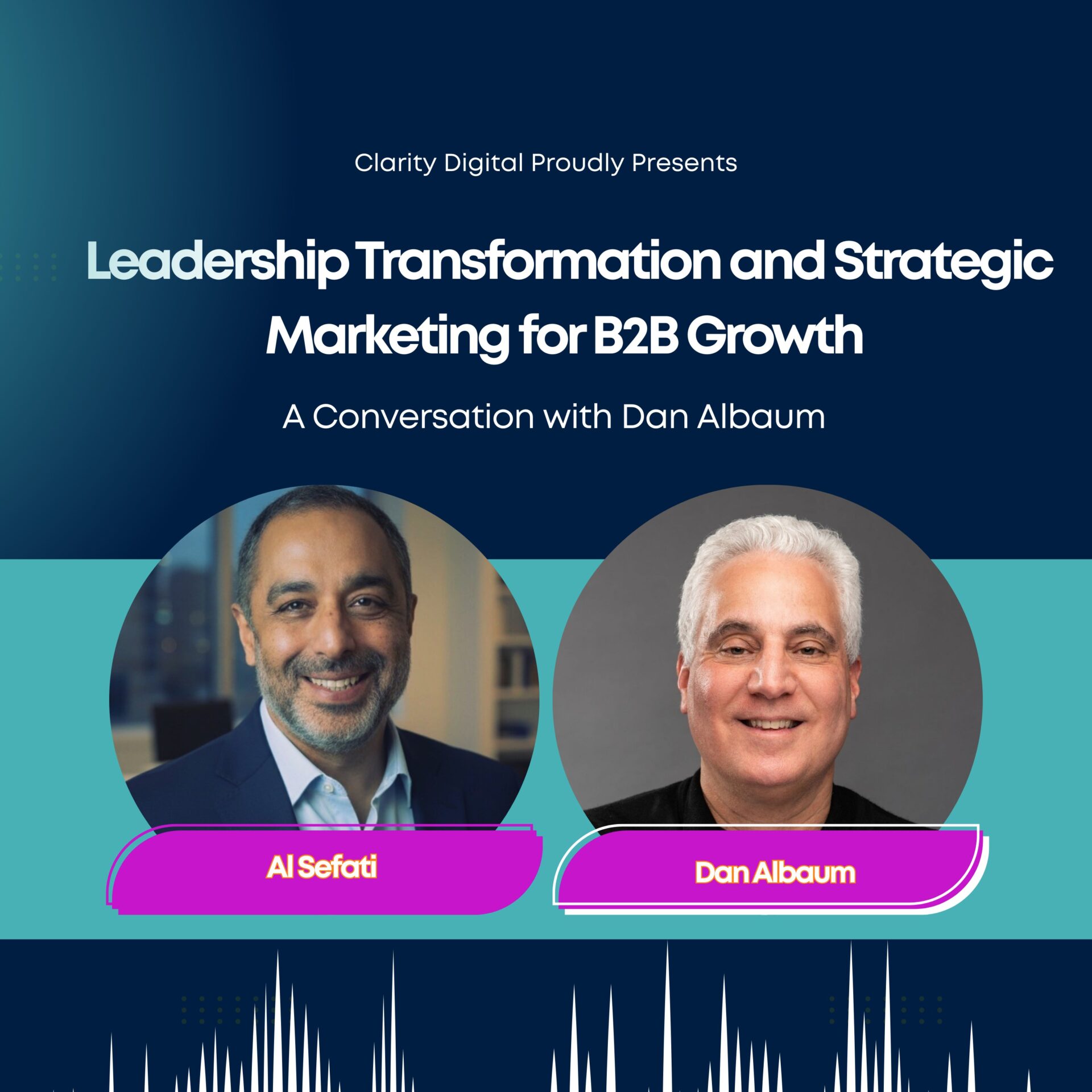A Conversation with Mark Kelly Clarity Digital Pod, hosted by Al Sefati
If you’re in the digital marketing game, chances are you’ve felt the tremors of AI disrupting everything from SEO to PPC. On this episode of Clarity Digital Pod, I sat down again with long-time Google Ads expert Mark Kelly from Inbound Revenue to unpack what’s going on inside Google Ads, what’s broken, what’s working, and how AI is reshaping it all — for better or worse.
Mark’s been in the trenches long enough to cut through the fluff. So in this episode, we got real — not just about strategies and platforms, but about how PPC is evolving in the age of AI and what agencies and clients need to rethink if they want to stay competitive.
Let’s dig in.
From Cabernet to CPC: Setting the Stage
It’s a Friday afternoon, Mark’s sipping a cabernet, I’m still on coffee — welcome to the time zone struggle of remote podcasting. But it didn’t take long before we got into it.
Mark and I both agreed that the PPC landscape is changing fast. But not all change is good, and not all AI-powered solutions are actually solutions. We opened with the state of Google’s newest product, Search Generative Experience (SGE) and its AI-infused offspring like Performance Max and Search Max.
“Take PMax and make it worse — that’s Search Max AI,” Mark says.
And he’s not wrong. Google seems to be layering on automation and AI without fully thinking through the performance implications, especially compared to solid, old-school Search campaigns.
Google Is Playing Catch-Up
Let’s call it what it is — Google is reacting. They got caught off guard by OpenAI’s release of ChatGPT and the quality of conversational search. Now, with Perplexity, Claude, and ChatGPT all threatening Google’s informational search stronghold, Google’s scrambling to pivot. But while Google’s AI has gotten better — Gemini is no longer the embarrassment Bard was — it’s not enough to say they’re ahead.
The problem is that Google built its empire around transactional intent. As AI-powered tools take over top-of-funnel information-seeking queries, Google’s remaining edge lies in the final steps of a purchase decision — and that’s exactly where PPC lives.
AI vs Google Ads: Noise vs Signal
Mark brought it back to basics:
“AI is noise. Google is still signal. People make buying decisions on Google.”
That’s the key takeaway. The buyer journey may start in ChatGPT or on Perplexity, but it ends on Google, at least for now.
That means PPC managers should focus their budgets and keywords on bottom-of-funnel, transactional intent, while building visibility in AI environments through digital PR and brand-driven content.
Local SEO Is a Map Game Now
As we both noted, organic listings are getting buried further and further beneath ads, LSAs, maps, and knowledge panels. On mobile, it’s even worse. That means if you’re doing local SEO, you better be optimizing for Google Maps, not just blue links.
We talked through examples — like a personal injury attorney client who ranked in the top 3 organic spots but got more calls from LSAs, GMB, and Google Ads than from SEO. The takeaway? Organic still matters, but it’s priority #4 for many local verticals.
Local Service Ads (LSAs): Great in Theory, Pain in Practice
We dug deep into Local Services Ads — and here’s the truth: LSAs are powerful, but they’re not easy.
You have almost no control. Your listing visibility depends on reviews, responsiveness, and whether your documentation (like insurance and licenses) is up to date. One lapse and your leads dry up.
Mark gave some real talk:
“Most of our LSA management is just making sure people do the things they’re supposed to do.”
And if you’re not responding to message leads, Google’s going to rank someone who does.
Should Everything Be Under One Google Account?
We riffed on the age-old problem of fragmented Google accounts — Search Console in one email, Ads in another, GMB in a third. For SEO, it’s not ideal. For Google Ads, it’s chaos.
The verdict? Keep everything under one account if you can. It makes location extensions, GMB connections, and reporting smoother. Plus, Google is already collecting more signals from interconnected properties.
That said, there’s always a risk of account suspensions affecting multiple properties. Still, unless you’re pushing the envelope, those are rare now.
Why Google Ads Talent Is in Decline
This is something Mark and I keep circling back to — the new wave of PPC talent is different.
And not in a good way.
Most of them are “set it and forget it” types who don’t do real keyword research, don’t log in frequently, and rely too heavily on automation.
“They’re not Google Ads experts. They’re Google Ads operators.”
The art of the deep-dive keyword strategy, the obsession over search terms, the day-to-day optimization — it’s getting lost.
Too many “experts” are letting AI do everything, including driving campaigns into walls.
Should You Run Manual CPC? Or Go All-In on Automation?
We debated campaign types and bidding strategies.
Mark’s been running experiments on Manual CPC vs Maximize Clicks vs Target CPA. What we’ve both seen is that Max Clicks starts slow and takes forever to learn — and clients get impatient fast.
For brand-new campaigns, you might still need to test Manual CPC with exact match, even if exact match now acts more like phrase or broad.
And don’t get us started on how broad match ruins campaigns without tight controls and a smart negative keyword strategy.
Broad Match: The Devil’s Bargain
Broad match has its place, but only if you’re in full control.
If you’re a nonprofit, or running experiments for more volume, fine. But it needs oversight. We both agreed — you never go in with all broad match unless you’re desperate.
And if you’re getting cheap clicks, something’s wrong. True Google Ads traffic — with buying intent — is expensive. It just is.
Negative Keywords and Automation: Where AI Could Help
This is where I see real opportunity. Daily negative keyword maintenance is essential but repetitive — and frankly, it’s a waste of senior talent’s time.
I’ve been experimenting with Make.com (an automation platform like Zapier but more robust) to automate tasks like:
- Adding negatives based on daily queries
- Monitoring budgets
- Triggering alerts on performance drops
- Sending campaign reports without logging in
This is where AI should live — smart automation, not campaign strategy.
Mark’s take?
“I’ll adopt AI when I see useful implementations. So far, not much.”
He’s not wrong. Most AI-powered PPC tools overpromise and underdeliver. Until we see something that actually improves qualified lead flow, it’s mostly hype.
Performance Max: Proceed with Caution
We’ve both tested it. It’s a mixed bag.
You can get more leads. You will get more garbage.
Mark nailed it:
“Even if you get better CPL, the perception is that you’re sending junk.”
So unless you’ve got a bulletproof lead qualification system, PMax can backfire — especially for service businesses. For e-commerce, it’s a better fit. But exclude brand or you’ll end up cannibalizing your own traffic.
Stop Pausing Campaigns. You’re Killing Performance.
One of the biggest rookie mistakes in Google Ads? Pausing your campaigns when you’re busy, and turning them back on when you need leads.
That kills momentum. It resets the learning phase. And it tanks performance.
Mark and I both see this all the time, especially with SMBs.
“Have someone answer the phone while you’re gone. Just reduce budget. Don’t pause.”
Sound advice.
AI in Marketing: Real Talk
We wrapped with some thoughts on AI’s future in marketing.
Yes, it’s scary. Yes, it’s exciting. But most of it is still hype over substance. There’s no such thing as an “AI agency.” That’s a made-up label. True value will come from people who know how to combine strategy, automation, and deep platform knowledge.
We’re not losing our jobs to AI yet — not unless you let it happen.
If you’re a serious marketer, learn how to use AI to do more, not to do everything.
Final Thoughts: Google Ads Isn’t Going Anywhere But It is Changing
Google Ads isn’t going anywhere — but how we use it needs to change. AI’s not going to save your bad campaigns. But it can help you scale what works.
Stay strategic. Stay skeptical. Automate the boring stuff, and double down on human insight.
That’s the future of PPC.
Mark Kelly can be found at inboundrevenue.com, where he helps agencies and direct clients build better Google Ads strategies.
This was Clarity Digital Pod, hosted by Al Sefati.





